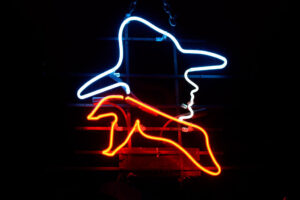Whenever I return to Britain from the United States, I am always struck by the compactness of the landscape. The tidy square fields, the orderly rows of homes with little gardens, the narrow ribbons of road curving between hedgerows, small cars weaving through a domesticated landscape dotted with sheep and cows. Even the places that we tend to think of as wild, such as the Scottish Highlands, reflect millennia of human intervention.
America, by contrast, is much wilder — with its mountains, deserts, hurricanes, bears and rattlesnakes. Unlike in the orderly UK, it’s easy to feel here as if the state has all but disappeared. Surely America’s vast landscape must play some role in shaping political life?
Certainly, following Donald Trump’s victory, it is impossible not to notice the profound contrast between the two countries. Over the last few years British politics has had a decidedly sad, small-country energy. Boris Johnson and “cash for curtains”, Liz Truss and the lettuce, Rishi Sunak in the rain, Keir Starmer snaffling free Taylor Swift concert tickets. In the US, on the other hand, we have an epic political drama that people will be writing about centuries from now. In the last three months, multiple assassins attempted to kill one candidate while plutocrats defenestrated a senile emperor so they could continue to exercise power through a talentless cypher. In a late plot twist, the plutocrats were thwarted, and now their nemesis is preparing to return to the seat of power. Clearly, this level of drama can only happen in a big country where people carve the faces of their greatest leaders into a mountain.
The physical environment shapes politics in other ways too. Consider the perpetual debate over gun rights and the Second Amendment, for instance. This is extremely perplexing to outsiders, partly because they do not understand the sacred role of the Constitution. But there is also a pragmatic reason for gun ownership, which I learned from my father-in-law, who grew up in the Texas panhandle. Out there, he told me, the counties are huge, and police are few and far between. Dial 911 and you might be waiting a long time for help to arrive. In a wilderness full of coyotes, snakes, and bears, you need to be able to protect yourself.
You see this sentiment reflected in American attitudes to hunting. When I was growing up in the UK, the image of a hunter was a toff in a red coat, perched on a horse, setting his dogs on a fox. In the US, there is still an element of man against nature, of waiting for hours to shoot dinner, or perhaps to take out a feral hog with razor-sharp tusks charging at you at 25 miles per hour. This is also why the Democrats sent their bumbling vice presidential candidate Tim Walz into a field with a gun: to demonstrate that he was worthy of the male vote, he had to inflict violence upon nature. When he was filmed struggling to load his weapon, he was mercilessly ridiculed, and instantly lost credibility.
Another way the landscape has shaped American politics is by its sheer scale. A large nation forges a different type of politician: to play the game of power in such an immense country, you must become big yourself. In Britain we have a vestigial memory of this; anyone who reads history cannot help but be struck by the fact that our imperial elites, fighting uprisings across the globe while translating Thucydides for amusement, seem like an alien species. Small island Britain no longer has need of such grandiose figures, and for decades has only produced mediocrities and nonentities. Americans, by contrast, have the confidence of a people who have conquered an epic landscape. Trump made his money by developing the land and erecting garish hotels on what was once wilderness. But he is only one rich man among many. America’s rulers know that there is much left to exploit, but you cannot do that if you go small, so the land forges grandiose liars, monumental crooks, and titanic phonies.
America’s landscape is abundant in resources, and this, too, plays out in political debates. In the UK, the case for renewable energy is bolstered by an understanding that resources are finite: one day the oil will run out, and that will be that. In America, though, there are deserts, forests, mountains, glaciers, swamps. How can a land so huge and diverse not feed itself, make its own cars, and produce its own energy? If you exhaust one area, you could just look elsewhere, or dig deeper, “drill baby drill”. This vastness also fuels a greater confidence in renewables. When I see a lone wind turbine in a field in the UK, I imagine it might just about provide enough power for a toaster. When I see the endless rows of turbines rotating slowly in the deserts of West Texas, I am struck by the transformative potential of the wind.
This sense of abundance also defines attitudes towards immigration. Economists may argue that mass immigration is necessary for growth, especially in the face of declining populations, but in Europe the emotional case is centred on inherited guilt: migrants should be welcomed as recompense for historical crimes of racism and imperialism. In America, the emotional case is more positive: it emphasises generosity, that there’s enough for everyone. “Give me your tired, your poor, / Your huddled masses yearning to breathe free” goes the poem by Emma Lazarus inscribed in bronze inside the Statue of Liberty. Pro-immigration arguments always point to the fact that America is a nation of immigrants, and that they should extend the good fortune their ancestors enjoyed to newcomers. Indeed, Matt Yglesias’s book One Billion Americans is predicated on America’s great abundance: not only could the land house one billion people, he argued, but this would lead to still greater riches. You could never make this argument on a small, crowded island such as the UK — nor in any European country, for that matter.
But just as America is blessed with great natural wealth, so it must regularly suffer the Wrath of God in the form of recurring natural disasters, such as hurricanes, forest fires and periodic earthquakes. These, too, have a direct impact on politics, although the extent of the political fallout of a disaster depends on which party is in power at the time. For instance, following Hurricane Katrina, George W. Bush’s administration was pilloried for weeks and then months; the inadequate disaster response was clear evidence of Republican perfidiousness and racism. Following Hurricane Helene, however, there was infinitely less coverage, as the Democrat’s media stenographers feared harming Kamala Harris’s chances of success in the election. Perhaps, now that she has been soundly defeated, they will develop a curiosity about what is happening in the affected regions.
These disasters also provide regional politicians with opportunities to demonstrate that they are effective in a crisis — if they fail, then their foes make hay. The ice storm that struck Texas in 2021, causing major power outages across the state, was still being used in political attack ads against Governor Greg Abbott two years later. When Kamala Harris argued that Ron DeSantis was refusing her calls and using the crisis to play political games, Joe Biden, perhaps bitter from his ousting, took the opportunity to undermine her by calling DeSantis “gracious”.
Yet when all is said and done, I think that the American landscape’s ultimate contribution to US politics is something that is at the core of the American character: optimism. The belief that better days are ahead has been central to American politics for as long as I have been alive, from Ronald Reagan’s “Morning in America” to Barack Obama’s “Hope” to Kamala’s “Joy” and even Trump’s “Make America Great Again”. No matter how polarised American politics becomes, both Republicans and Democrats agree that a new dawn is always right around the corner. And as traumatised as the Democrats may currently be by their crushing defeat, I am confident that they too will soon lift their gaze from the smouldering ruins of the Kamala campaign and once again find hope.
Those who view America from the outside may find this optimism baffling. The same goes for those who live in coastal metropolises and spend far too much time online, succumbing to feverish fantasies that a new civil war is looming. Yet step outside the dysfunctional cities, leave behind the demented discourse and actually enter the landscape and you will find that a sense of renewal is never far away. It’s everywhere: on the edge of a great lake, in the desert, on top of a mountain, or simply driving past immense fields, teeming with crops. This land — diverse, abundant, wild — is still young. And this is why, for all the talk of the end of America, and despite the corrupt media and devious politicians, optimism keeps breaking through.
Disclaimer
Some of the posts we share are controversial and we do not necessarily agree with them in the whole extend. Sometimes we agree with the content or part of it but we do not agree with the narration or language. Nevertheless we find them somehow interesting, valuable and/or informative or we share them, because we strongly believe in freedom of speech, free press and journalism. We strongly encourage you to have a critical approach to all the content, do your own research and analysis to build your own opinion.
We would be glad to have your feedback.
Source: UnHerd Read the original article here: https://unherd.com/



